Outdoor scavenger hunts are a fun and interactive way to enjoy the great outdoors with friends, family, students, or coworkers. They provide an opportunity for bonding, team building, and problem-solving. Whether you’re planning a weekend activity, a birthday party, or a team-building event, an outdoor scavenger hunt is sure to create lasting memories and laughter.
In this guide, we will provide you with a step-by-step plan to help you prepare and execute the perfect outdoor scavenger hunt. From brainstorming ideas to considering the venue and ensuring safety, we’ve got you covered. So gather your crew, put on your adventure hats, and get ready to embark on an unforgettable expedition filled with outdoor fun and excitement!
Key Takeaways:
- Outdoor scavenger hunts are a great way to bond and have fun with friends, family, or coworkers.
- Brainstorming ideas and creating a unique theme are essential for a successful scavenger hunt.
- Outdoor scavenger hunts can be cost-effective by using items you already have or accessing free resources online.
- Make sure you have all the necessary items and supplies for your scavenger hunt.
- Choosing the right venue and ensuring safety are key considerations for an outdoor scavenger hunt.
Brainstorming Ideas for Your Outdoor Scavenger Hunt
Before you embark on planning your outdoor scavenger hunt, take some time to brainstorm exciting ideas that will make your hunt unique and enjoyable. Consider the interests of your group and the location where the scavenger hunt will take place. Here are a few brainstorming ideas to get you started:
- Nature-Themed Scavenger Hunt: Create a scavenger hunt that focuses on exploring the natural world. Participants can search for specific plants, animals, or natural landmarks while learning about the environment.
- City Adventure: If you are planning a scavenger hunt in the city, design clues and challenges that lead participants to discover iconic landmarks, historical sites, or hidden gems around town.
- Treasure Hunt: Create a pirate or treasure-themed scavenger hunt, where participants must follow a series of clues to find a hidden treasure chest or a valuable artifact.
- Themed Scavenger Hunt: Choose a specific theme that aligns with the interests of your group, such as a sports-themed hunt, a movie-inspired hunt, or a mystery-themed hunt.
Remember to tailor your scavenger hunt to the age and abilities of the participants, ensuring that the challenges are engaging and achievable. Get creative with your clues and have fun designing a memorable outdoor adventure.
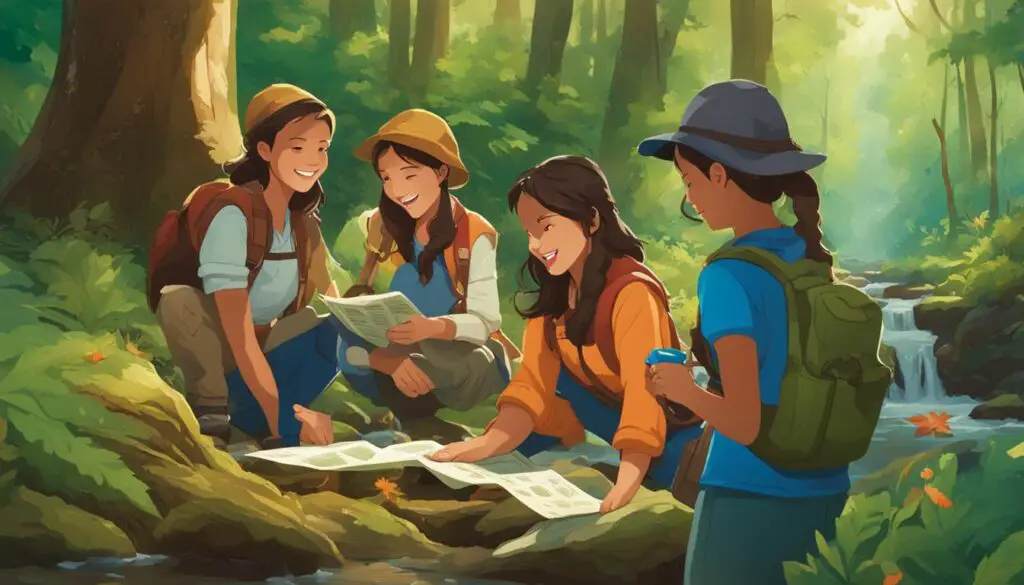
Table: Outdoor Scavenger Hunt Ideas
| Theme | Description |
|---|---|
| Nature-Themed Hunt | An exploration of the natural environment, searching for specific plants, animals, or natural landmarks. |
| City Adventure | Discovering iconic landmarks, historical sites, or hidden gems in the city. |
| Treasure Hunt | Following a series of clues to find a hidden treasure chest or valuable artifact. |
| Themed Scavenger Hunt | Choosing a specific theme, such as sports, movies, or mysteries, and incorporating related challenges. |
“The best ideas come from taking a step back and looking at the world through the eyes of a child. Let your imagination run wild and create an outdoor scavenger hunt that will leave lasting memories.”
Cost Involved in Planning an Outdoor Scavenger Hunt
Planning an outdoor scavenger hunt is not only a thrilling adventure but also a cost-effective activity that can be enjoyed by all. Whether you’re organizing a hunt for your family, friends, or colleagues, there are various options to fit your budget. Let’s explore the cost considerations and discover some free scavenger hunt ideas that will make your event memorable without breaking the bank.
Cost Considerations for Your Outdoor Scavenger Hunt
When planning your outdoor scavenger hunt, it’s important to consider the potential expenses and find ways to minimize costs. Here are some factors to keep in mind:
- Clues and lists: Creating your own clues and lists is a cost-effective option. Use your creativity to design riddles or tasks that will engage participants without requiring additional expenditure.
- Supplies: Basic supplies like paper, pens, or pencils are commonly required for participants to mark off their discoveries. These items are usually inexpensive and can be easily obtained.
- Venue: Choosing a free public venue, such as a park or beach, eliminates the need for rental fees. However, if you opt for a private venue, be sure to consider any associated costs.
By carefully considering these cost factors, you can plan an exciting outdoor scavenger hunt within your budget.
Free Scavenger Hunt Ideas
If you’re looking for free scavenger hunt ideas that provide ready-made clues and lists, the internet offers a wealth of resources. Websites and apps dedicated to scavenger hunts provide a wide range of options, from nature-themed hunts to city explorations. These free resources allow you to create an unforgettable scavenger hunt experience without spending a dime. Simply search online, choose a theme that suits your group, and gather the necessary materials to embark on your adventure.
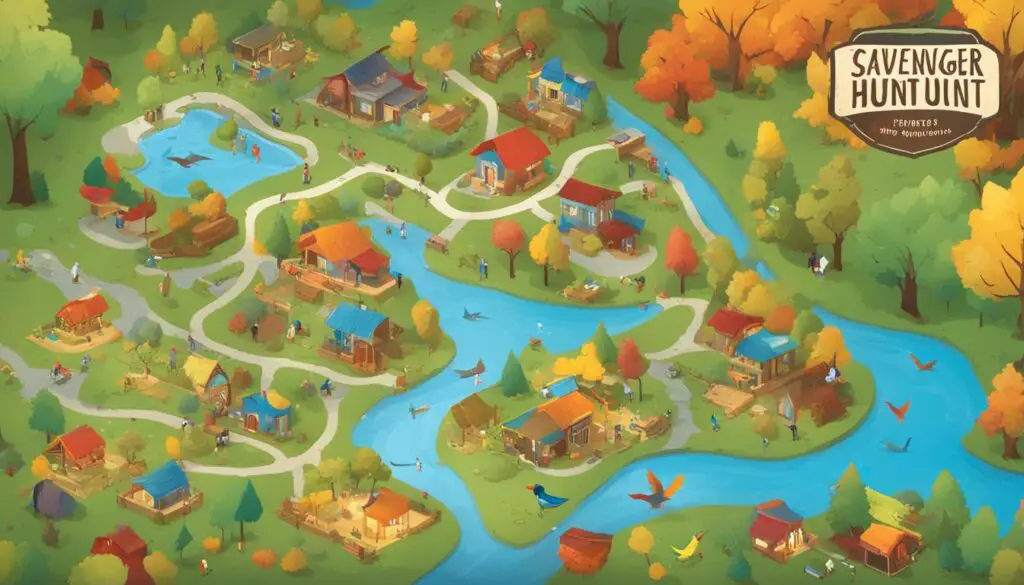
Remember, planning an outdoor scavenger hunt doesn’t have to be expensive. With a little creativity and resourcefulness, you can create an enjoyable and memorable experience for everyone involved.
Items Needed for Your Outdoor Scavenger Hunt
Planning an outdoor scavenger hunt requires careful consideration of the items and supplies you will need. These essential items will help ensure a successful and enjoyable experience for all participants. Here is a list of items to include in your scavenger hunt preparation:
- Clue cards or riddles: Create engaging clues or riddles that will lead participants to their next destination or item to find.
- List of items: Compile a comprehensive list of items for participants to locate during the scavenger hunt. These items can be nature-based, location-specific, or theme-related depending on the overall concept of your scavenger hunt.
- Pens or pencils: Provide writing utensils for participants to mark off their finds on the list. This will help keep track of progress and add a sense of accomplishment to the scavenger hunt.
- Timekeeping device: Have a way to keep track of time during the scavenger hunt. This can be a watch, smartphone, or any other device that allows you to monitor the duration of the activity.
- Additional items: Consider the location and weather conditions when planning your scavenger hunt. Depending on the circumstances, you may need to provide participants with sunscreen, bug spray, or rain gear to ensure their comfort and safety.
By having all the necessary items and supplies ready, you can ensure a seamless and well-organized outdoor scavenger hunt experience. Prepare in advance and double-check your checklist to avoid any last-minute hiccups on the day of the event.
| Items | Supplies |
|---|---|
| Clue cards or riddles | Create engaging clues or riddles that will lead participants to their next destination or item to find. |
| List of items | Compile a comprehensive list of items for participants to locate during the scavenger hunt. |
| Pens or pencils | Provide writing utensils for participants to mark off their finds on the list. |
| Timekeeping device | Have a way to keep track of time during the scavenger hunt. |
| Additional items | Consider the location and weather conditions when planning your scavenger hunt. |
Having all the necessary items and supplies ready will ensure a seamless and well-organized outdoor scavenger hunt experience.
Be Prepared for Adventure
When planning your outdoor scavenger hunt, it’s essential to gather all the items and supplies needed. Clue cards or riddles will guide participants to their next destination or item to find, creating an exciting and engaging experience. Compile a list of items that participants need to locate during the scavenger hunt, whether they are nature-based, location-specific, or theme-related. Additionally, make sure to provide pens or pencils for participants to mark off their finds, keeping track of progress.
Don’t forget to have a timekeeping device to monitor the duration of the hunt and ensure that participants stay on track. Depending on the location and weather conditions, you may also need additional items such as sunscreen, bug spray, or rain gear to ensure everyone’s comfort and safety. A well-prepared scavenger hunt with the right items and supplies will make for an unforgettable adventure in the great outdoors.
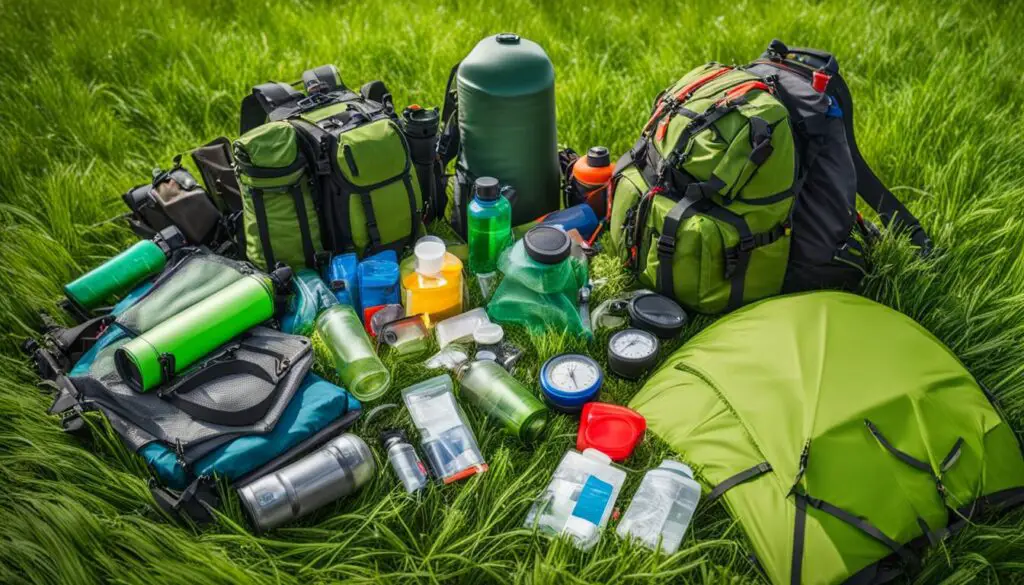
Venue Considerations for Your Outdoor Scavenger Hunt
When planning your outdoor scavenger hunt, choosing the right venue is crucial for a successful and enjoyable experience. The venue sets the stage for the adventure and plays a significant role in the overall atmosphere of the hunt. Here are some important considerations to keep in mind when scouting for a scavenger hunt location:
Location Size and Accessibility
Consider the size of the space you will need to accommodate your group comfortably. Will you be hosting a small family gathering or a large corporate event? Ensure that the venue can accommodate the number of participants and provide enough room for everyone to move around freely. Additionally, consider the accessibility of the location. Is it easily reachable by all participants, including those with mobility challenges?
Safety and Permissions
Prioritize the safety of your participants by choosing a venue that is suitable for the age group and activities involved in the scavenger hunt. Scout potential locations for any potential hazards, such as uneven terrain or areas with limited visibility. Additionally, check if the chosen venue requires any permits or permissions for your event. Some public spaces may have specific rules or regulations that need to be followed.
Hiding Spots and Landmarks
Scavenger hunts rely on hidden clues and items, so it’s important to choose a venue with plenty of hiding spots and landmarks. Parks, gardens, and beaches often offer a variety of natural hiding spots, such as trees, rocks, or specific landmarks. If you prefer an urban setting, consider landmarks, statues, or historical sites as potential hiding spots. Ensure that the location has enough diversity in hiding spots to keep the scavenger hunt challenging and engaging.
| Location Size and Accessibility | Safety and Permissions | Hiding Spots and Landmarks |
|---|---|---|
| Consider the size of the space and accessibility | Prioritize safety and check for required permissions | Choose a venue with plenty of hiding spots and landmarks |
| Ensure it can accommodate your group comfortably | Scout for potential hazards and safety concerns | Select a location with diverse hiding spots |
| Accessible for participants with mobility challenges | Follow any rules or regulations for the chosen venue | Consider natural or urban landmarks as hiding spots |
By considering these factors and taking the time to scout potential locations, you can find the perfect venue for your outdoor scavenger hunt. Remember, the venue sets the stage for the adventure, so choose wisely and create an unforgettable experience for all participants.
Supervision and Safety During Your Outdoor Scavenger Hunt
Ensuring the safety of participants is of utmost importance during an outdoor scavenger hunt. Proper supervision and adherence to safety guidelines are essential to create a secure and enjoyable experience for everyone involved. By establishing clear rules and precautions, you can minimize potential risks and maximize the fun.
When organizing an outdoor scavenger hunt, consider the age group and number of participants. Depending on their age and maturity level, you may need to provide adequate supervision. Make sure there are enough responsible adults or individuals present to monitor the activity, offer guidance, and assist if needed.
Implementing safety guidelines is crucial to minimize accidents and ensure a smooth scavenger hunt. Communicate the rules to all participants before the event begins, emphasizing the importance of following them. Some essential safety guidelines include:
- Staying hydrated and taking regular water breaks
- Avoiding dangerous or off-limits areas
- Practicing good outdoor etiquette, such as not littering or harming plants and animals
- Encouraging participants to watch out for one another and help anyone in need
By promoting a safe and responsible environment, you can create a memorable outdoor scavenger hunt where participants can explore, learn, and have fun without compromising their well-being.
| Guidelines | Explanation |
|---|---|
| Stay hydrated | Remind participants to bring water bottles and take regular breaks to drink water, especially on hot or sunny days. |
| Be aware of hazards | Warn participants about potential hazards, such as uneven terrain, slippery surfaces, or low-hanging branches, and provide instructions on how to navigate them safely. |
| Stay together | Encourage participants to stay in groups and avoid splitting up to ensure everyone’s safety and prevent anyone from getting lost. |
| Follow traffic rules | If the scavenger hunt involves crossing roads or busy areas, remind participants to obey traffic signals and use designated crosswalks. |
| Be mindful of surroundings | Advise participants to be respectful of private property, wildlife, and the natural environment, and to not disturb or damage anything during the hunt. |
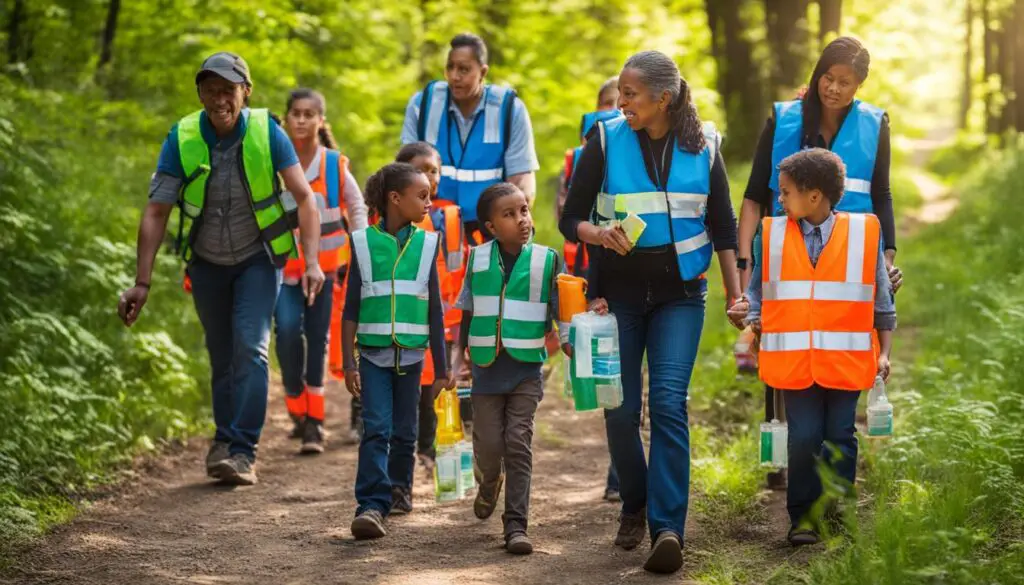
Ways to Invite and Involve Youth in Your Outdoor Scavenger Hunt
Outdoor scavenger hunts are a fantastic way to engage and entertain children while encouraging them to explore and learn about the great outdoors. To make your scavenger hunt enjoyable and inclusive for youth, here are some ideas and strategies you can consider:
- Create age-appropriate clues and challenges: Tailor the difficulty level of the scavenger hunt to the age group of the children participating. Younger kids may need simpler clues and tasks, while older ones can handle more complex challenges.
- Make the hunt interactive and educational: Incorporate educational elements into the scavenger hunt by including questions or mini-lessons about nature, wildlife, or local history. This will not only make the hunt more engaging but also help children learn while having fun.
- Encourage teamwork and collaboration: Divide children into teams and encourage them to work together to solve clues and find items. This promotes communication, cooperation, and problem-solving skills.
- Involve children in the planning process: Let children contribute their ideas and suggestions for the scavenger hunt. This empowers them and makes the experience more personalized and exciting. They can help come up with clues, select the location, or even create their own mini-challenges.
Life Skills Being Taught
Outdoor scavenger hunts provide an excellent opportunity to teach children essential life skills while having fun. Here are some life skills that can be incorporated into the scavenger hunt:
- Problem-solving: By solving clues and finding hidden items, children learn to think critically and find solutions to challenges.
- Communication: Working in teams and discussing clues encourage effective communication skills.
- Collaboration: The need to cooperate and collaborate with others teaches children teamwork and cooperation.
- Decision-making: Making choices during the scavenger hunt helps children develop decision-making skills.
- Time management: Setting time limits for the hunt and sticking to a schedule teaches children to manage their time effectively.
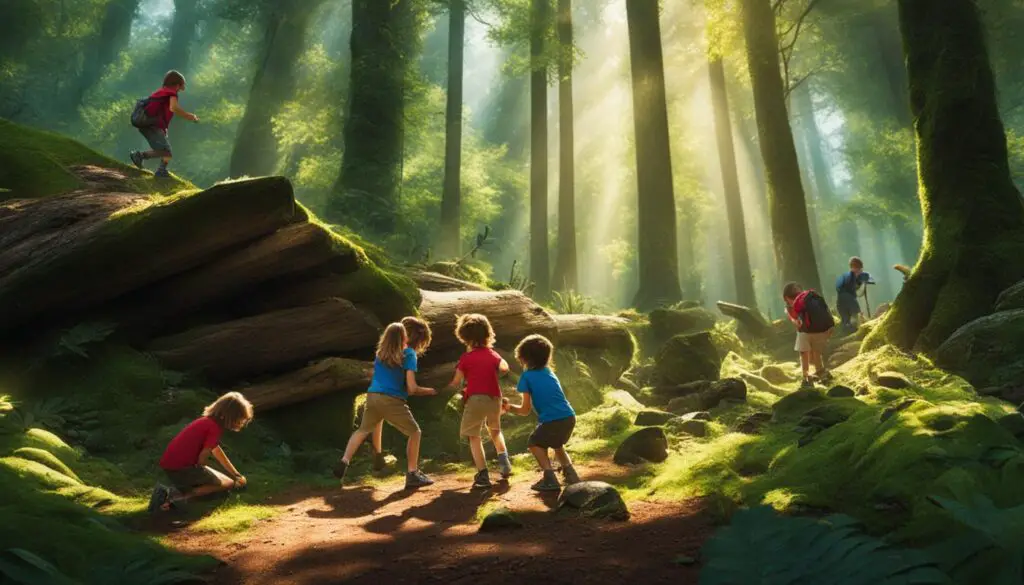
By incorporating these strategies and focusing on essential life skills, you can plan an outdoor scavenger hunt that not only provides entertainment but also promotes learning and personal growth among the youth participants. This memorable experience will inspire a love for the outdoors and create lasting memories.
Plan for Fun: Adding an Element of Excitement to Your Outdoor Scavenger Hunt
The key to a successful outdoor scavenger hunt is to plan for fun and excitement. Incorporate elements of adventure and challenge into your hunt to keep participants engaged and motivated. Whether you’re organizing a scavenger hunt for kids, adults, or a mix of both, there are plenty of ways to make it an unforgettable outdoor adventure.
To add an element of excitement, consider incorporating outdoor adventure games into your scavenger hunt. These games can include physical challenges, mental puzzles, or team-building activities to keep participants on their toes. For example, you could design a relay race where teams have to complete tasks or obstacles before moving on to the next clue.
Another way to make your scavenger hunt more exciting is by including outdoor activities for children. Children love to explore and engage with their surroundings, so plan activities that allow them to do just that. Incorporate nature-themed tasks, such as identifying different types of plants or animals, or include sensory experiences like a blindfolded taste test of various fruits found along the scavenger hunt route.
Remember, the goal is to create an interactive and enjoyable experience for all participants. By adding an element of excitement to your outdoor scavenger hunt, you’ll create lasting memories and inspire a spirit of adventure in everyone involved.
Life Skills Being Taught:
- Problem-solving: Participants will have to think critically and use their problem-solving skills to decipher clues and complete challenges.
- Teamwork: Scavenger hunts provide an opportunity for participants to collaborate, delegate tasks, and work together towards a common goal.
- Communication: Participants will need to effectively communicate with their team members to coordinate their efforts and share information.
- Time management: Completing a scavenger hunt within a specified timeframe requires participants to manage their time wisely and prioritize tasks.
- Outdoor skills: Engaging in an outdoor scavenger hunt helps participants develop skills such as navigation, observation, and environmental awareness.
Conclusion
Outdoor scavenger hunts provide a unique and exciting way to spend time outdoors, bond with others, and have fun. By following the steps outlined in this guide, you can plan and prepare the perfect outdoor scavenger hunt adventure.
Evaluate the hits and misses from your scavenger hunt to learn and improve for future events. Reflect on the challenges participants enjoyed and the areas where you can make adjustments. Their feedback is valuable for creating even better scavenger hunts in the future.
Encourage participants to share their experiences and suggestions for future scavenger hunts. Consider planning future scavenger hunts based on their interests and ideas. This will not only keep the activity engaging and exciting but will also show your commitment to catering to their preferences. With proper planning and creativity, you can create unforgettable memories and inspire a spirit of adventure in everyone involved.
FAQ
How can I brainstorm ideas for my outdoor scavenger hunt?
Consider different themes such as nature-themed or location-specific. Make a list of possible items or landmarks to find and create clues or riddles.
Are there cost-effective options for planning an outdoor scavenger hunt?
Yes, you can create your own clues using items you already have, or find free scavenger hunt ideas online. There are also paid options available for a more professional experience.
What items do I need for an outdoor scavenger hunt?
You will need clue cards or riddles, a list of items to find, pens or pencils for marking off finds, and a way to keep track of time. Additional items like sunscreen or rain gear may be necessary depending on the location and weather.
How do I choose the right venue for an outdoor scavenger hunt?
Consider factors like size, accessibility, and safety. Scout potential locations beforehand and ensure they have enough hiding spots for clues and items. Popular options include parks, gardens, beaches, or even your own backyard.
Do I need supervision during an outdoor scavenger hunt?
Depending on the age group and size of participants, supervision may be necessary. Ensure there are enough responsible individuals to monitor the activity and establish safety guidelines.
How can I involve children in an outdoor scavenger hunt?
Use age-appropriate clues and items, make the hunt interactive and educational, and involve children in the planning process. Encourage teamwork and provide opportunities for learning and skill-building.
How can I add excitement to an outdoor scavenger hunt?
Incorporate elements of adventure and challenge, and consider adding additional games or activities along the way. Provide opportunities for interaction, fun, and enjoyment of the outdoor environment.
What should I consider for future planning of outdoor scavenger hunts?
Evaluate the success of your current hunt, gather feedback from participants, and consider their interests and suggestions for future events. Plan for improvement and create unforgettable memories for everyone involved.

